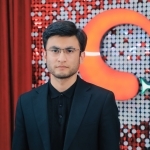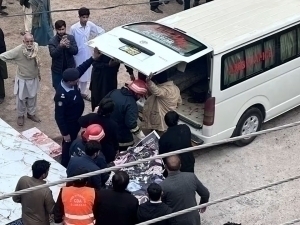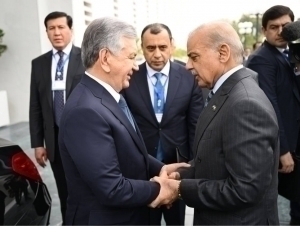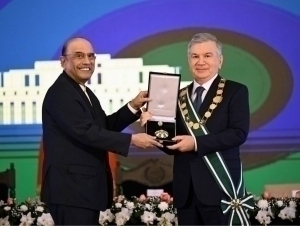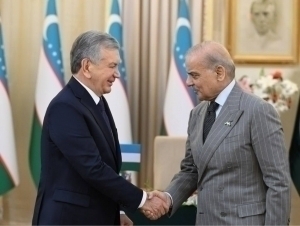Midweek: Italy’s strategic moves in Uzbekistan, Trump driving his friend crazy, Putin narrowly escapes death, Durov granted temporary freedom
Review
−
29 May 2025 13910 11 minutes
Italian Prime Minister Giorgia Meloni, representing one of the world's seven most powerful countries and leading the government of the world’s eighth-largest economy, has arrived in Uzbekistan.
This marks Meloni’s second visit to the country. Her first was on July 31, 2024, when she briefly stopped in Tashkent following an official visit to Beijing. During that visit, she met with Uzbek Foreign Minister Bakhtiyor Saidov, who conveyed President Shavkat Mirziyoyev’s greetings. These visits reflect a deepening relationship with Italy — Uzbekistan’s first strategic partner in Western Europe, third within the European Union, and 11th overall in terms of global trade.
On May 28–29, Meloni is making an official visit to Uzbekistan. After holding meetings in Samarkand, she will fly to Kazakhstan on May 30 to attend the first-ever Central Asia–Italy Summit. Originally scheduled for late April, the summit and Meloni’s visit were postponed following the death of Pope Francis. Italy was then focused on funeral preparations and receiving visiting dignitaries in Rome. Now, the long-anticipated visit has finally taken place.
According to the Uzbek presidential press service, this visit follows up on agreements made during President Mirziyoyev’s official trip to Italy on June 7–9, 2023. That visit marked a historic milestone, as Italy formally became Uzbekistan’s first strategic partner in Western Europe. Over 40 agreements totaling 9 billion euros were signed, laying the groundwork for continued high-level talks — such as those now taking place in Samarkand.
So what is Italy aiming to achieve with this renewed attention to Uzbekistan — a country with a population of 37 million, growing economic influence, and close ties with Afghanistan, a focal point of regional security concerns? Over the past three years, visits between the two nations have become increasingly frequent. Although diplomatic ties were first established in 1992, it was not until the second quarter of 2023 that relations truly deepened.
It began with Italian Defense Minister Guido Crosetto’s visit to Uzbekistan on April 26, 2023. This set off a wave of high-level exchanges. On July 8, 2023, President Mirziyoyev made an official visit to Italy, where he met with Prime Minister Meloni and President Sergio Mattarella. That visit is especially remembered for the signing of a strategic partnership agreement. In return, less than five months later, President Mattarella made a reciprocal visit to Uzbekistan, accompanied by his daughter, Laura Mattarella.
For Italy, Uzbekistan represents both an economic opportunity and a strategic security partner. The shift became especially relevant after Russia’s invasion of Ukraine, which pushed the European Union to seek alternative energy sources. Italy, like France, has since paid closer attention to Central Asia, participating in various levels of dialogue, including the “1+5” format between the EU and Central Asian nations. While France and Italy share similar views on the region, each pursues its own national interests.
After Donald Trump came to power, the global geopolitical landscape shifted considerably. One of the consequences was a sharp decline in trust between the Élysée Palace and the White House. In response, France began seeking new avenues for cooperation and diversification, particularly in the area of natural resources. French interest has increasingly centered around uranium. Meanwhile, Italy—although an ally of France—has continued to pursue its own strategic priorities, focusing more on energy and defense. For Rome, Central Asia has emerged as a critical region for energy security. Italy already enjoys strong energy ties with Turkmenistan, Uzbekistan’s neighbor, and considers Uzbekistan a valuable partner in the region. Recently, both Italy and France have shown interest in launching promising projects in Central Asia’s energy sector.
Currently, trade relations between Italy and Uzbekistan are characterized by a significant imbalance. Italy largely exports to Uzbekistan, while Uzbekistan remains a net importer. Italian exports primarily include industrial equipment and production lines, electric motors, household appliances, medical devices, and pharmaceuticals. In return, Italy imports knitwear, copper, cotton, and mineral raw materials from Uzbekistan. However, the trade disparity is notable. According to "Trading Economics", in 2024 Uzbekistan’s exports to Italy were valued at approximately \$85 million, while imports from Italy reached around \$500 million—almost six times higher. This suggests that Italy views Uzbekistan as a growing market for its goods. With a population nearing 38 million—accounting for about 45% of Central Asia’s total—Uzbekistan represents nearly half of the region’s consumer demand.
Uzbekistan also plays an increasingly strategic role in security and migration, particularly concerning Afghanistan. In 2021, Rome evacuated around 5,000 Afghan citizens from Kabul with logistical support from Tashkent and other neighboring countries—one of the highest figures among EU states. The Italian-operated logistics hub in Termez also played a key role in delivering humanitarian aid to Afghanistan. For Italy, cooperating with regional influencers like Tashkent and Astana is vital not only for geopolitical influence but also for economic diversification. Uzbekistan, often referred to as the “gateway to Central Asia,” is central to this approach. Its consistent multi-vector foreign policy has fostered a strong foundation of trust with international partners. For instance, shortly after Russia’s invasion of Ukraine, Uzbekistan’s Foreign Minister declared in the Senate that the country would not recognize the Russian-backed separatist regions of Donetsk and Luhansk—demonstrating a commitment to sovereignty and principled neutrality.
Uzbekistan’s pragmatic approach to foreign policy has also been evident in its balanced stance toward Turkey. At the first EU–Central Asia summit in Samarkand, Tashkent reaffirmed its position by supporting two UN resolutions—one rejecting recognition of the Turkish Republic of Northern Cyprus, and another opposing any form of cooperation with it. These moves have reinforced Uzbekistan’s image in the West as a country free from external influence, committed solely to protecting its national interests. This perception has likely contributed to France and Italy—two of Europe’s centrist powers—strengthening ties with Tashkent in recent years.
However, warm relations between Uzbekistan and the West have not come without challenges. Tensions have occasionally spiked due to Moscow’s dismissive attitude toward Uzbekistan’s sovereignty, its interference in domestic affairs, and instances of diplomatic disrespect—such as the widely discussed incident between Foreign Ministers Sergey Lavrov and Bakhtiyor Saidov. In addition, a 2023 interview with China’s ambassador to France, in which he questioned the legitimacy of post-Soviet states' independence, served as a warning to Tashkent. Such provocations have likely driven Uzbekistan to diversify its partnerships and deepen ties with countries like Italy and other EU members.
At the conclusion of the May 29 talks in Samarkand, President Shavkat Mirziyoyev and Prime Minister Giorgia Meloni signed a joint declaration to strengthen strategic partnership relations. A ceremony was held to exchange a wide range of bilateral agreements. These included deals on investment promotion and protection, cooperation on strategically important raw materials, migration and freedom of movement, collaboration with the Climate Fund and the Italian Agricultural Confederation, and joint efforts in “green” development with Italian companies Sogesid and Ansaldo. Agreements were also signed with universities in Tuscany, Pisa, and Turin, as well as with the Italian National Research Council, SIMEST, Danieli, the University of Perugia, and other institutions. To honor the partnership, one of the streets in Samarkand was renamed after the city of Rome.
Durov returns
After nine months under investigation by French authorities, Telegram founder Pavel Durov has been allowed to return to Dubai for a second time. Durov announced via his Telegram channel that he would be in Dubai during the first week of June and hinted at “good news” ahead.
Durov, who holds dual citizenship in France and the United Arab Emirates, has been under judicial supervision since his arrest at a French airport in August 2024. In September, he was formally charged with six counts of illegal activity linked to Telegram’s operations, primarily related to the platform’s alleged failure to prevent harmful content and its refusal to cooperate with law enforcement. He was previously permitted to travel to Dubai from March 15 to April 7 this year while the investigation continued.
While in France two weeks ago, Durov leveled serious accusations against the French government. He claimed that French intelligence attempted to use him to influence the Romanian elections. According to a post on his X account, Durov said the head of French intelligence had requested his assistance in undermining Romania’s conservative political forces. The French government strongly denied these claims, calling them unfounded and urging respect for Romanian democratic processes.
Nevertheless, suspicions surrounding Romania’s presidential election have since intensified. In the first round on May 4, conservative candidate George Simion led with 41% of the vote, while liberal candidate Nicușor Dan trailed at 21%. However, in a surprising turn of events, Dan secured 54% in the second round—largely due to strong support in the capital—while Simion finished with 46%. Initially, Simion accepted the results and congratulated Dan, but after Durov’s explosive comments, he reversed course, calling for protests and urging Romania’s Constitutional Court to annul the election results.
Durov responded by expressing his willingness to testify “if it helps Romanian democracy.”
Is Trump and Putin’s friendship over?
The relationship between Donald Trump and Vladimir Putin continues to raise eyebrows, fluctuating between diplomacy and open criticism. Trump's recent remarks about the Russian president have sparked renewed attention in both Washington and Moscow.
The situation escalated after a phone call between the two leaders on May 19. Many European observers viewed the call as a diplomatic win for Putin. The following day, Trump publicly stated he would not impose new sanctions on Russia, triggering fears that he might be abandoning support for Ukraine. However, these fears were amplified when, just days later on May 24, Russia launched a massive attack on Kyiv using ballistic missiles and drones.
In response, Trump sharply changed his tone. He condemned Putin’s actions, calling him “crazy” and suggesting that the Russian leader’s ambitions might include occupying all of Ukraine. Trump warned that such a move could lead to the “collapse of Russia” and confirmed that he was seriously considering reintroducing sanctions. According to "The Wall Street Journal", Trump is weighing a package of new sanctions that could be announced by the end of the week.
Despite the sharp rhetoric, the Kremlin responded with calculated calm. Presidential spokesperson Dmitry Peskov described Trump’s outburst as a result of “emotional tension” from facilitating behind-the-scenes negotiations between Moscow and Kyiv. He stated that Trump’s involvement had been constructive, but that it came at the cost of emotional strain—implying that the former president’s criticisms were not to be taken at face value.
Trump, however, did not back down. In a follow-up post on social media, he claimed that “very bad things” would have already happened to Russia if not for his efforts. He added that Putin is “playing with fire.”
Putin narrowly escapes drone strike
One of the most sensational developments of the week came from Russian state television, where Commander of the Air Defense Unit Yuri Dashkin revealed that President Vladimir Putin’s helicopter was targeted by Ukrainian drones during a recent trip to the Kursk region.
According to Dashkin, the Russian president was en route to the region when the aircraft he was traveling in came under attack by military drones operated by the Ukrainian Armed Forces. The helicopter reportedly found itself at the center of a coordinated defensive operation. Dashkin stated that Russian forces intercepted and destroyed 46 aircraft-type drones during the assault. He emphasized that air defense units successfully protected Putin's aircraft while simultaneously neutralizing the broader aerial threat.
President Putin visited Kursk on May 20, where he met with volunteers at a humanitarian aid headquarters, held talks with local authorities, and inspected the construction site of the Kursk Nuclear Power Plant-2 in the city of Kurchatov. He also met with the acting regional governor, Alexander Khinshtein.
This marked Putin’s second visit to the region in recent months. On March 12, he held a high-level meeting in military uniform at a command post belonging to the Kursk military group. During that visit, Russian Chief of General Staff Valery Gerasimov presented a briefing on the then-ongoing encirclement of Ukrainian forces in the region.
The Kursk region has been a flashpoint in the conflict. On August 6 of last year, the Ukrainian Armed Forces launched an offensive that, within days, resulted in the reported capture of 28 settlements and the evacuation of approximately 180,000 residents—121,000 of whom left voluntarily, according to then-governor Alexei Smirnov.
However, the situation shifted over time. The Russian Ministry of Defense later announced the recapture of 59 settlements, including Sudzhan—the only city taken by Ukrainian forces. On April 26, Russian officials declared the complete expulsion of Ukrainian troops from the region. General Gerasimov notably expressed gratitude to North Korean military personnel for their reported assistance in regaining control.
Live
All